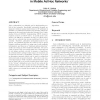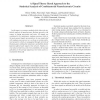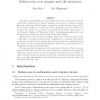247 search results - page 15 / 50 » Extracting All the Randomness from a Weakly Random Source |
MOBIHOC
2002
ACM
14 years 7 months ago
2002
ACM
Auto-configuration is a desirable goal in implementing mobile ad hoc networks. Specifically, automated dynamic assignment (without manual intervention) of IP addresses is desirabl...
MSWIM
2005
ACM
14 years 1 months ago
2005
ACM
We consider the problem of energy aware localized routing in ad hoc networks. In localized routing algorithms, each node forwards a message based on the position information about...
NTMS
2009
IEEE
14 years 2 months ago
2009
IEEE
—New approaches that generate secret keys from radio channel characteristics have been recently proposed. The security of these schemes usually relies on the reciprocity principl...
DATE
2006
IEEE
14 years 1 months ago
2006
IEEE
In this paper we present a method which allows the statistical analysis of nanoelectronic Boolean networks with respect to timing uncertainty and noise. All signals are considered...
FOCS
2008
IEEE
14 years 2 months ago
2008
IEEE
A merger is a probabilistic procedure which extracts the randomness out of any (arbitrarily correlated) set of random variables, as long as one of them is uniform. Our main result...



